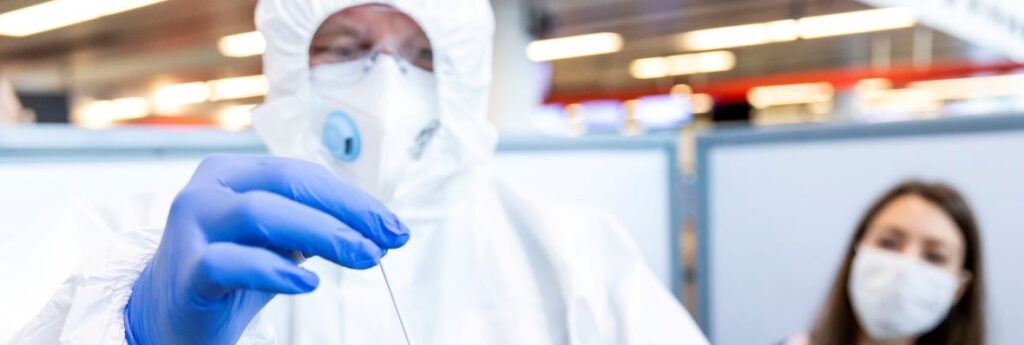The slow but inexorable move towards putting the kibosh on quarantines for travellers continues with the news that Alberta will become the first jurisdiction in Canada to conduct rapid COVID-19 testing. Importantly, the initiative is government, not airline, sponsored.
Starting Nov. 2, international air travellers arriving in Calgary and at the Coutts land border crossing can take part in a voluntary federal-provincial pilot project that will allow individuals producing a negative COVID-19 test result to quarantine for just two days instead of 14, conditional on them taking a second test within six or seven days of arrival.
Participants are also to be closely monitored through daily symptom checks and will be required to follow health measures such as wearing masks in public, avoiding visits to high-risk groups, and staying in province for two weeks.
The move is designed to help the province’s struggling service and tourism industry, which is expecting a 63 percent drop in visitor spending this year.
“We cannot turn our back on the travel, the tourism industry and the Albertans’ lives that have been thrown into upheaval,” Premier Jason Kenney told the Associated Press, adding, “COVID is not going away any time soon.”
Kenney says only about three percent of active cases in Alberta have been acquired through travel.
Calgary Airport Authority president Bob Sartor says the testing pilot project is “what we have all been waiting for months. This innovative, government-approved, science-based testing trial for international arriving guests is the lifeline that airports and airline partners need to instil confidence in air travel once again.”
Canada’s major airlines similarly welcomed the news.
Air Canada, which partnered with McMaster HealthLabs (MHL) and the Greater Toronto Airports Authority earlier this year for an ongoing study to demonstrate the validity of testing as a means to ease travel restrictions and quarantine requirements, said it expects the Alberta project to add to the “rich data” from its own test results to “lead to a loosening of the federal government’s quarantine requirements immediately.”
“Rapid testing is a means to enable governments to relax current blanket travel restrictions and quarantines in a measured way while still safeguarding the health and safety of the public,” said Dr. Jim Chung, Air Canada’s Chief Medical Officer.
Meanwhile, WestJet President and CEO Ed Sims said, “We have been asking for a science-based approach based on multiple layers of testing to help safely ease the quarantine requirements. With our home and largest hub in Calgary, guests from the province will be the first to experience this important trial as an alternative to a 14-day quarantine.”
In Europe, rapid testing at airports is well underway. On Friday, Austrian Airlines in partnership with Vienna Airport began trials for using rapid COVID-19 antigen tests. During an Oct. 23-Nov. 8 trial period, Berlin-bound passengers on flight OS 229 are invited to take a voluntary, free test with results provided within 10-15 minutes. Boarding cards are only activated if the test results are negative, enabling the passenger to gain entry to the security area and gate. If the test results are positive, the affected passenger will be taken by the airport medical service to fully clarify the individual’s medical condition. (If they can’t continue to travel, passengers can rebook or cancel their ticket for free).
Austrian Airlines’ parent company, the Lufthansa Group, says findings derived from test operations in Vienna will be integrated into an overall test project it is implementing.
Austrian aviation state secretary Magnus Brunner commented, “The pilot project allows us to venture a look into the near future and, above all, to demonstrate the feasibility of the necessary processes… In this way, we are taking a step towards ‘new normality’ in order to give our social life and economy a corresponding boost.”
IATA says initiatives like Lufthansa’s are enabling the aviation industry to set out “a clear vision of systematic pre-departure testing to give governments the confidence to re-open borders,” but adds, “It is essential that governments around the world adopt a harmonized and coordinated approach to safely re-open borders without quarantine by using COVID-19 testing.”
“Quarantine of any length will continue the economic destruction of COVID-19” and the airline industry, says Rafael Schvartzman, IATA’s Regional VP for Europe. “Testing must replace, not shorten, quarantine. And testing costs should be borne by governments, in line with the WHO’s International Health Regulations. Swift and consistent action is essential if the year-end travel season is to be saved in any form.”
Meanwhile, Ontario Premier Doug Ford says he will be keeping “a really sharp eye” on the Alberta testing initiative.
“I’d be open to it, but I just first want to see what’s happening in Calgary with it, because Toronto is much different than Calgary,” he said.
Kenney said if the project goes well, it will be expanded to the airport in Edmonton.

